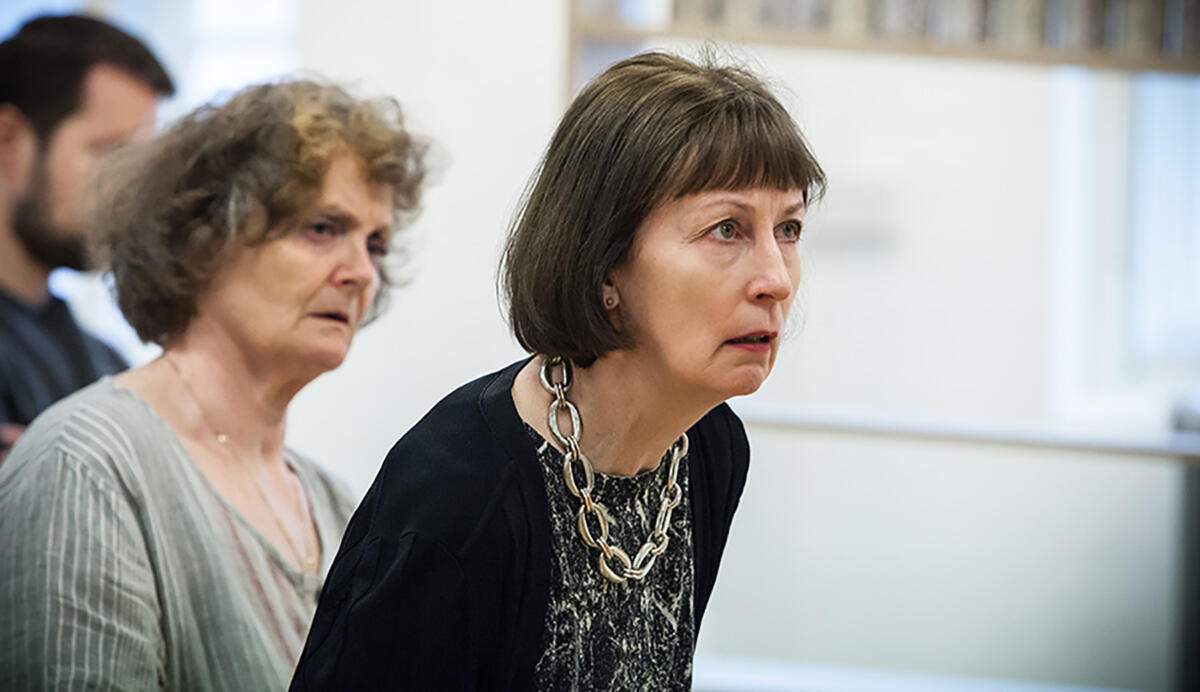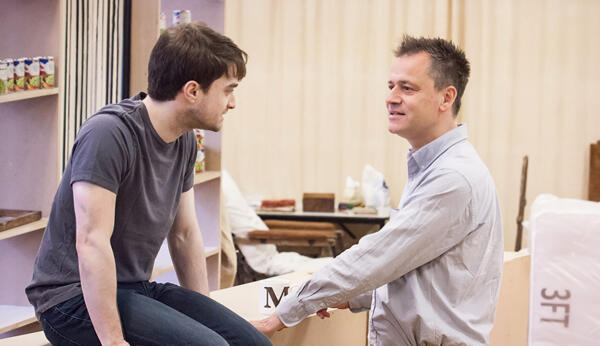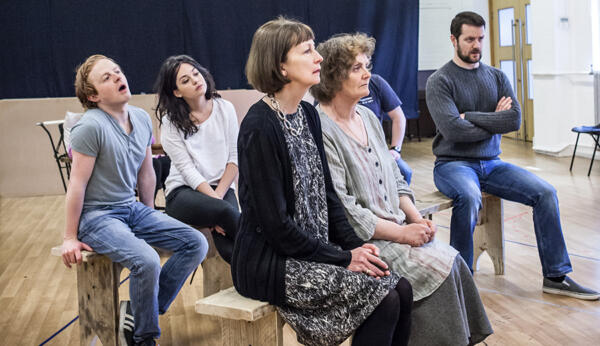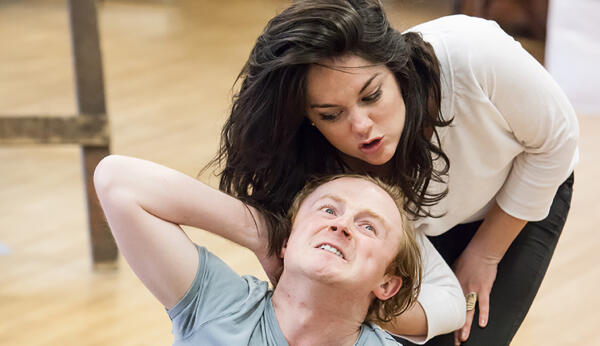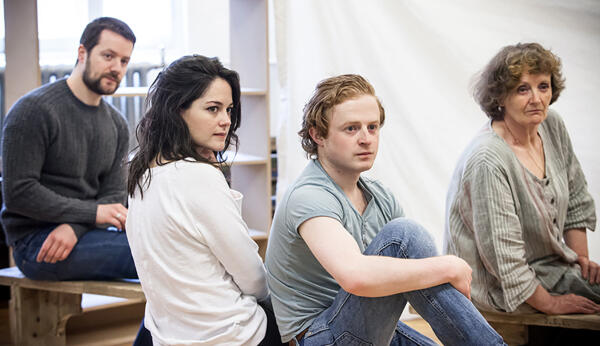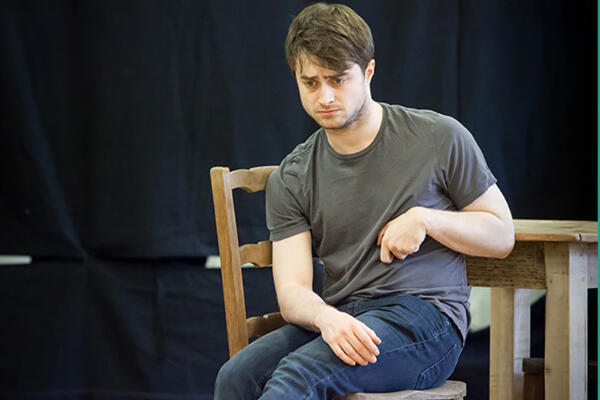The Cripple of Inishmaan | Inside the Rehearsal Room
The Cripple of Inishmaan– Week Two, Day Two
Scene Six is the focus of today’s rehearsal. Michael works with Sarah Greene and Conor MacNeill, playing brother and sister Helen and Bartley McCormick. They run the scene once, following which Michael comments, ‘I’m absolutely thrilled with where you both are in the second week of rehearsals’. He then asks questions about the characters and their motives.
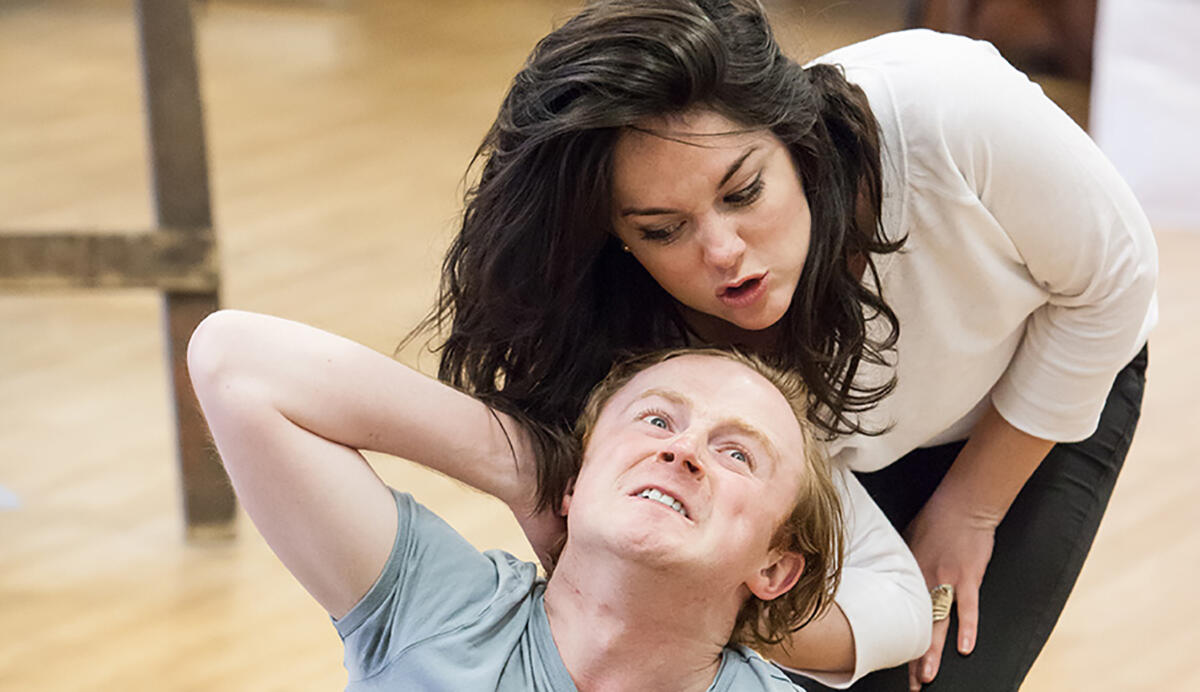
Michael observes that, on her entrance, Helen needs to find Bartley doing nothing – waiting for Kate and his sweets – to prompt her line, ‘What are you waiting for?’ The actors run the opening exchange again. ‘Good,’ says Michael, then adds: ‘You’re not quite talking to each other, though.’ He encourages them to connect with each other more and returns to first principles: ‘Partly, at the moment, the speed on the lines is at the expense of the thought. The line, the thought and the pace are allied. Remember, it’s the top of the second half, we’ve been away, had a drink, decided we’ll stay and now we have to re-settle and need all the help in the world in these first few minutes.’
Michael helps ground Conor in the moment: ‘The “uber-motive” of this scene for Bartley is waiting for Fripple-Frapples. Right now, “I, Bartley, am engaging in a conversation about eggs”.’
The actors run the scene section-by-section with Michael making suggestions. He listens carefully to the dialogue and its delivery. ‘Is it just curiosity that makes you ask that, Bartley – “What did you kick the egg-man in the shins for?” – or do you have a view on it? What’s the attitude?’ Michael continually champions the text: ‘There’s one line I’m not getting’; ‘You’re slightly misrepresenting the text there’; ‘There’s a better inflection for you’. He may focus on a specific word: ‘Pick out “murdered” more.’ (Bartley: ‘But it was you murdered Jack Ellery’s goose and Pat Brennan’s cat for them.’) Michael keeps returning to the unity of thought and speech: ‘There isn’t a Martin McDonagh pause there so you can put the thought on the line.’
His attention to detail covers every element of performance, from speech to movement: ‘What’s the reason for that move?’ He continues to ask the actors about their characters’ motivations, the intention behind a particular line or movement. He warns the actors against ‘illustrating’ moments. Focusing on Bartley sitting on the shop counter, Michael says: ‘That would be the line to jump down on for me, because it actually propels you.’ He considers swapping Helen and her brother. ‘Let’s look at a different version of that where Helen shoves Bartley out of the way and takes that position for herself.’ Watching the scene again, Michael comments: ‘I’ll tell you what I would like, to open up the space a bit.’
He and the actors consider the development of the scene. ‘The waiting at the beginning has been eclipsed by one or two much more interesting pieces of news.’ He explores the progression of Helen and Bartley’s conversation, ensuring they continue to make contact with each other, reflecting on one of Helen’s lines: ‘You’re making sure Bartley hears it, consumes it, cogitates it.’ Of a sudden change of thought, Michael asks, ‘Now where’s that come from?’ He invites the actors to fill in any missing details, those things left unsaid in the play. For example, ‘Does Jim Finnegan’s daughter have a name?’ Sarah and Conor, with much laughter, agree upon Fidelma. In reviewing the scene, Michael returns to the beginning: ‘I think we’ve forgotten the waiting.’
A couple of times during today’s rehearsal the issue of accent and pronunciation is raised. ‘Where it’s problematic,’ reflects Michael, ‘is when one person says a word one way and, in the same scene, someone says it another.’ He reminds the actors that a significant function of his role in rehearsal is to represent the audience: ‘I’m sitting here on behalf of all those people.’ Listening to the scene again, Michael comments: ‘My ear hears two versions of “cat”.’ (And later ‘voice’.) The more English-sounding pronunciations are favoured as better for this production’s audience.
Michael constantly seeks to clarify the narrative with the actors, particularly which characters knew what when. In this instance, he focuses upon Billy’s letter – ‘How do you know about it?’ he asks Sarah of Helen. ‘Does that mean we the audience are hearing for the first time that the “TB letter” has been shared with the island? That this information has gone global.’
Attention then turns to the moment in the scene where Helen breaks several eggs over Bartley’s head. It needs to be considered within the world of the play – Why does she do it? What motivates her? – but also from a practical point of view, which is why Company Stage Manager Katy Bryant joins the rehearsal. Michael requests a towel for Sarah to clean her hands on after breaking the eggs. He wonders how Stage Management will clear this away during the performance and Katy suggests a removable piece of flooring.
‘The egg should be a surprise to us too,’ says Michael, while highlighting the need for some context: ‘We need a little more here about Helen’s history with eggs – it helps us.’ He proposes running the scene with a real egg and encourages Sarah and Conor to, ‘See what happens if you just keep going, rather than stopping to analyse it’. Afterwards Michael acknowledges, ‘That’s a hard transition that one’. He advises Sarah to take a moment following the egg breaking: ‘In the chaos and hilarity of that the audience will react. You’ll need to find some space for, “There’ll be worse casualties than eggy hair…”.’
Moments such as above need to be carefully considered and Michael ensures that every instance of physical contact between actors, including the ‘Chinese Burns’ Helen inflicts on Bartley, has been covered in dedicated fight rehearsals.
At the end of Scene Six, Kate – played by Ingrid Craigie – ‘slowly enters from the back room, absent-mindedly’. The scene is run to the end, following which Michael comments to Ingrid: ‘There’s something about the simplicity of what you’re doing that tells us exactly where you are in this place. It’s a nice understated way of bringing the issue of depression on stage.’
